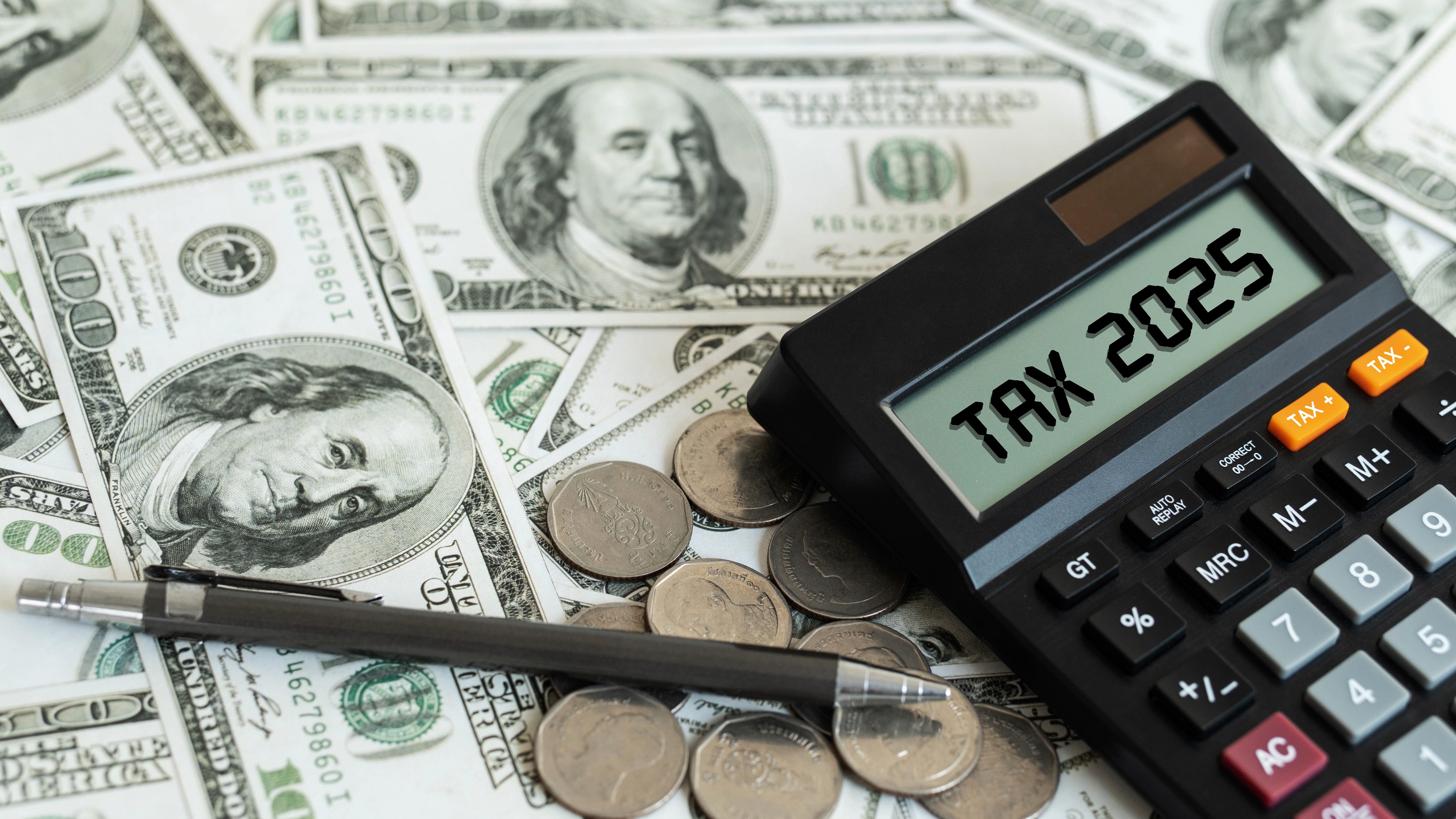Beware the Caller From “The Government”: It’s a Scam
Scammers' persistence is matched only by their insolence: They even try to impersonate the very agencies trying to stop their grift.

Profit and prosper with the best of Kiplinger's advice on investing, taxes, retirement, personal finance and much more. Delivered daily. Enter your email in the box and click Sign Me Up.
You are now subscribed
Your newsletter sign-up was successful
Want to add more newsletters?

Delivered daily
Kiplinger Today
Profit and prosper with the best of Kiplinger's advice on investing, taxes, retirement, personal finance and much more delivered daily. Smart money moves start here.

Sent five days a week
Kiplinger A Step Ahead
Get practical help to make better financial decisions in your everyday life, from spending to savings on top deals.

Delivered daily
Kiplinger Closing Bell
Get today's biggest financial and investing headlines delivered to your inbox every day the U.S. stock market is open.

Sent twice a week
Kiplinger Adviser Intel
Financial pros across the country share best practices and fresh tactics to preserve and grow your wealth.

Delivered weekly
Kiplinger Tax Tips
Trim your federal and state tax bills with practical tax-planning and tax-cutting strategies.

Sent twice a week
Kiplinger Retirement Tips
Your twice-a-week guide to planning and enjoying a financially secure and richly rewarding retirement

Sent bimonthly.
Kiplinger Adviser Angle
Insights for advisers, wealth managers and other financial professionals.

Sent twice a week
Kiplinger Investing Weekly
Your twice-a-week roundup of promising stocks, funds, companies and industries you should consider, ones you should avoid, and why.

Sent weekly for six weeks
Kiplinger Invest for Retirement
Your step-by-step six-part series on how to invest for retirement, from devising a successful strategy to exactly which investments to choose.
The calls come from people saying they’re with the FBI or the IRS or Social Security or any number of government agencies; They’re all thieves.
If you get an unsolicited call from a government agency, hang up. Social Security, Medicare, the IRS, the FBI and others do not make cold calls and demand payment or personal information.
Scammers have more ways to con you out of your money than there are government agencies — and there are a lot of government agencies.
From just $107.88 $24.99 for Kiplinger Personal Finance
Become a smarter, better informed investor. Subscribe from just $107.88 $24.99, plus get up to 4 Special Issues

Sign up for Kiplinger’s Free Newsletters
Profit and prosper with the best of expert advice on investing, taxes, retirement, personal finance and more - straight to your e-mail.
Profit and prosper with the best of expert advice - straight to your e-mail.
This particular tactic has grown so popular that those agencies are regularly issuing warnings to alert people that scammers are impersonating them. Even the Federal Trade Commission, which is itself charged with tracking scams, has issued an alert warning people that scammers are posing as FTC commissioners trying to trick people out of their money by, for example, telling victims they won a federally supervised lottery or sweepstakes, but they have to pay taxes or a fee to get the money.
In one international conspiracy alone, federal authorities said, scammers placed tens of millions of calls to U.S. consumers looking for victims. While the vast majority of the targets may have just hung up or not taken the calls, thousands of people do get victimized every year.
Thousands Victimized, Millions Stolen
The Internet Crime Complaint Center, also known as IC3, received reports from more than 3,319 people over 60 who had been victimized by government impersonation fraud in 2021. The victims reported losses of more than $69 million, up from $45 million the previous year, although the number of victims was lower.
Amy Nofziger, director of fraud victim support with AARP, said the prevalence of government impersonation scams is “huge.” She added, “There’s not an hour that goes by on our helpline where we don’t get a report of some kind of government impersonation scam.” Seniors are attractive targets in part, she said, because they are more comfortable answering calls from unknown callers, while younger people who grew up with cell phones and caller ID tend not to pick up if they don’t know who’s on the other end. Fundamentally, Nofziger said, older people tend to have more respect for authority figures and the government. “When your government calls,” she said, “you are listening.”
Scammers Want You to Send Them Money Through Gift Cards
Nofziger said people should know, “The government will not call you unsolicited, bottom line. If you’re receiving a call that you did not initiate from someone in the federal government, it is not them.”
“The government will never threaten you with arrest, deportation, stopping of benefits” she said, “and they certainly will never ask for payment in prepaid gift cards, cryptocurrency, a peer-to-peer app such as Cash App, Venmo and Zelle and wire transfers.”
You might be wondering: how could anyone believe the government or a law enforcement agency would ever ask them to send money through, say, an iTunes card?
Nofziger says the victims, for one, react emotionally because they’re upset or anxious about the story they’re told And older people aren’t as familiar with gift cards and the way they’re sold in stores. It used to be, if you wanted a gift certificate, Nofziger said, you’d go to the store that the certificate was for and you’d get a paper certificate from the cashier.
The victims might not be familiar with the racks or carousels with plastic cards. The scammers will tell them they need to go to the store and get a prepaid voucher at the grocery store, to get the silver card or the yellow card on the carousel.
For that reason, Nofziger says, when she talks to older people, she tells them to get familiar with the carousels with cards on them the next time they go to the store. And if they’re ever told on the phone to pay a government agency using them, stop.
That Help With Your Government Benefits is a Scam
Another form of government imposter scams involve thieves who pose as people who can help with government benefits.
Genevieve Waterman, director of economic security at the National Council on Aging said Medicare open enrollment is an especially busy time for these scammers, who will pose as brokers ready to help their victims navigate the complicated choices they face.
Medicare beneficiaries, she said, “are inundated with many different mailings during the year, especially during open enrollment. We call it analysis paralysis.”
Nofziger said victims might receive a notice that they’re eligible for a government grant. These notices can come through emails or social media and sometimes appear to be postings or other communications from people the victims know.
Examples of Government Impersonation Scams in Action
How do these scams play out? We have lots of examples, so buckle up. Be warned, though, that these examples don’t even begin to cover all the ways that scammers trick, coerce and extort victims by pretending to be from the government. But knowing how they have worked is one important way to be alert to other scams.
For starters, look at the case of a married couple in Virginia prosecuted for their role in an international conspiracy in which participants impersonated government officials, including law enforcement officers, to trick victims into sending money.
In one part of this conspiracy, thieves posed as agents from the Drug Enforcement Administration, telling a victim that they found a vehicle near the U.S. southwest border that contained a large amount of cocaine and the victim’s bank information. The thieves persuaded the victim to surrender half the cash in her bank accounts as a sign of good faith until a thorough investigation could clear her.
Another federal case involved a scheme that stole more than $7.5 million from 54 victims, according to federal prosecutors. In that case, victims were called and told they were being investigated by federal law enforcement agencies, including the FBI, the Social Security Administration, the Department of Homeland Security, the Treasury Department and the DEA. The bogus agents told the victims their identities had been connected to a crime and that an order had been issued for their imminent arrest or deportation. Of course, the only way to avoid these consequences was to pay large sums of money.
The victims of that scheme were told to withdraw cash from their bank accounts and mail it to various addresses, which turned out to be Walgreens stores in northeastern Colorado.
In another case, federal authorities charged directors of six call centers based in India on accusations of making tens of millions of scam calls to U.S. consumers.
According to the Justice Department, one version of the scam from that conspiracy had the callers pretend to be federal agents contacting the victims to tell them their Social Security numbers were involved in crimes.
In another version, the callers said they were IRS employees calling because the victims owed back taxes.
In both of these scenarios, the callers threatened to arrest the victim if the victim didn’t send money.
Then there was the fake IRS email that went out telling potential victims they could get a third Economic Impact Payment if they clicked on a link to “access the form for your additional information” and “get help” with the application. But that link, the FTC warned, was a trick that, if clicked, could enable a scammer to steal victims’ money and personal information.
Medicare and Social Security Scams are Common
Social Security numbers are a common target. The Justice Department has issued a warning about a scam in which thieves pretending to be from the Social Security Administration call people and tell them their Social Security number has been suspended because of suspicious activity or because it’s been involved in a crime.
Thieves ask victims to confirm their number or they tell them to withdraw money from the bank and store it on gift cards for “safekeeping.” Victims are also told their accounts may be seized or frozen if they fail to act soon enough.
The Minnesota Attorney General issued a warning about a reported scam where callers claimed to be from Medicare, Social Security or an insurance company. They say new Medicare, Social Security or supplemental insurance benefits cards are being issued or that the beneficiary’s information on file needs to be updated. The thief asks the victim to verify or provide their personal banking information, which the scammer later uses to steal from the victim.
Then there are the scammers who impersonate local law enforcement officers and get victims to send money because subpoenas or warrants have been issued against them.
In one reported case, a physician was tricked by a caller in a sophisticated plot to pose as a police officer from the City of Miami. The caller, who was able to use technology to spoof the real police department’s phone number on caller ID, told the victim she had failed to appear in court as an expert witness and needed to pay an $8,000 fine.
These perpetrators often use robocalls. Victims may be told that their Social Security number has been inactivated and they need to “press 1” to speak to a government “support representative” for help reactivating it.
In yet another scam described by the FTC, thieves say they’re calling from the United States Citizenship and Immigration Service or another agency and there’s a problem with immigration paperwork. They tell the victims they need to pay to solve that issue.
The FTC also tells of scammers posing as court officials or sheriffs saying there’s a warrant for the victim’s arrest and they need to immediately pay a fine or bail to avoid having to go to jail.
Or these “court officials” say the victim needs to pay a fine for missing jury duty.
Callers Regret Sharing Information
Nofziger offered descriptions of calls the AARP helpline has received from scam victims:
- A consumer received a call from someone claiming to be from Medicare. She said they asked her for confidential information. She gave the caller her Social Security number and her mother's maiden name.
- A caller reported that she received a call from "Medicare." It was early so she wasn't thinking and just answered their questions which were seeking her Medicare number and her Social Security number. The person then thanked her and would be calling her back to let her know more about the program. She figured out then she shouldn't have given that information and wants to know what to do to protect herself.
- A caller was contacted by phone with an offer of free COVID testing kits He was also unsure why it was a minimum of 8 tests each for him and his wife. He provided his Medicare number and dates of birth for himself and wife but never got the testing kits.
- A caller received a text for an unauthorized purchase, $1537.45 for an Apple MacBook Pro, through Amazon. She was transferred to an alleged FTC agent and they claimed she had 24 bank accounts using her Social Security number. She was told to remove all the money from her bank account except $500 because she faced money laundering and obstruction of justice charges. She removed over $11,000 from her bank account. He sent her barcodes and sent her to Walmart to deposit $1500 each on 6 different bar codes. She was told there would be 2 agents coming to her door the next day.
- A caller said their mother was phoned by someone saying it was the FBI to tell her they were coming to arrest her for fraud on her Social Security number. The mother withdrew all her money from the bank and purchased gift cards for $11,000, as instructed by the caller.
Ways to Avoid Government Imposter Scams
The government will never call you and ask for personal information or money. If you get a call like that, hang up immediately.In addition, FBI, the IRS, the FTC and the Social Security Administration offer the following guidance and information for avoiding scams:
- Don’t wire money, send cash, or use gift cards or cryptocurrency to pay someone who says they’re with the government. Scammers ask you to pay these ways because it’s hard to track that money, and almost impossible to get it back.
- Don’t give your financial or other personal information to someone who calls, texts, or emails and says they’re with the government. If you think a call or message could be real, hang up and call the government agency directly at a number you know is correct.
- Don’t trust your caller ID. Your caller ID might show the government agency’s real phone number or even say “Social Security Administration,” for example. But caller ID can be faked.
- Don’t click on links in unexpected emails or text messages. Scammers send emails and text messages that look like they’re from a government agency, but are designed to steal your money and your personal information. Just delete the message.
- Do not take immediate action. If you receive a communication that causes a strong emotional response, take a deep breath. Hang up or ignore the message. Talk to someone you trust.
- Be skeptical. If you think a real law enforcement officer is trying to reach you, call your local law enforcement using a non-emergency number to verify. Do not believe scammers who “transfer” your call to an official or who give you a number as proof. Scammers can create fake numbers and identities.
The IRS will never:
- Call to demand immediate payment using a specific payment method such as a prepaid debit card, gift card or wire transfer. Generally, the IRS will first mail a bill to any taxpayer who owes taxes.
- Threaten to immediately bring in local police or other law enforcement groups to have the taxpayer arrested for not paying.
- Demand that taxes be paid without giving taxpayers the opportunity to question or appeal the amount owed.
- Call unexpectedly about a tax refund.
The FBI will never:
- Call or email private citizens to demand payment or threaten arrest. You will also not be asked to wire a “settlement” to avoid arrest.
- Ask you to use large sums of your own money to help catch a criminal.
- Ask you for wire transfers or gift cards.
- Call you about “frozen” Social Security numbers or to coordinate inheritances.
What to do if You’ve Been Targeted by Scammers
- Contact law enforcement.
- Members of the public are encouraged to report suspected Social Security fraud to the Office of Inspector General at https://oig.ssa.gov.
- File a complaint with the FBI IC3 at www.ic3.gov.
- If the scammer claimed to be from the IRS, Report the call using the IRS Impersonation Scam Reporting form or by calling 800-366-4484. And report the number to phishing@irs.gov and be sure to put "IRS Phone Scam" in the subject line.
- The Federal Trade Commission is the main agency that collects scam reports. Report government impersonation scams to the FTC online, or by phone at 1-877-382-4357 (9 a.m. to 8 p.m. ET).
Profit and prosper with the best of Kiplinger's advice on investing, taxes, retirement, personal finance and much more. Delivered daily. Enter your email in the box and click Sign Me Up.
Elaine Silvestrini has worked for Kiplinger since 2021, serving as senior retirement editor since 2022. Before that, she had an extensive career as a newspaper and online journalist, primarily covering legal issues at the Tampa Tribune and the Asbury Park Press in New Jersey. In more recent years, she's written for several marketing, legal and financial websites, including Annuity.org and LegalExaminer.com, and the newsletters Auto Insurance Report and Property Insurance Report.
-
 How Much It Costs to Host a Super Bowl Party in 2026
How Much It Costs to Host a Super Bowl Party in 2026Hosting a Super Bowl party in 2026 could cost you. Here's a breakdown of food, drink and entertainment costs — plus ways to save.
-
 3 Reasons to Use a 5-Year CD As You Approach Retirement
3 Reasons to Use a 5-Year CD As You Approach RetirementA five-year CD can help you reach other milestones as you approach retirement.
-
 Your Adult Kids Are Doing Fine. Is It Time To Spend Some of Their Inheritance?
Your Adult Kids Are Doing Fine. Is It Time To Spend Some of Their Inheritance?If your kids are successful, do they need an inheritance? Ask yourself these four questions before passing down another dollar.
-
 Trump’s Latest Pitch: No Taxes If You Earn Less Than $150K?
Trump’s Latest Pitch: No Taxes If You Earn Less Than $150K?Taxes The Trump administration reportedly wants to eliminate taxes for certain earners.
-
 Key 2025 IRS Updates: What You Need to Know
Key 2025 IRS Updates: What You Need to KnowFrom IRA contributions to Social Security COLAs and the standard deduction, several changes are headed our way. Get ready to make the most of them.
-
 Two Consequential Tax Cases You May Not Have Heard About
Two Consequential Tax Cases You May Not Have Heard AboutThe Supreme Court's decisions in these cases create uncertainty about challenging IRS regulations and guidance. Expect more litigation to follow.
-
 Do You Fear an IRS Audit? You Shouldn't if You Do Your Homework
Do You Fear an IRS Audit? You Shouldn't if You Do Your HomeworkIf you document everything, there’s no reason to freak out if the IRS audits you. Audits are mostly about seeking documentation, not making accusations.
-
 Three Reasons It May Look Like You Love the IRS More Than Your Family
Three Reasons It May Look Like You Love the IRS More Than Your FamilyConsider these strategies to avoid overpaying taxes on your hard-earned money. Your family will thank you for it. (And you’ll thank yourself.)
-
 Don't Overlook Tax on Crypto Staking Rewards: Kiplinger Tax Letter
Don't Overlook Tax on Crypto Staking Rewards: Kiplinger Tax LetterTax Letter The IRS has issued guidance on crypto staking rewards, but broker reporting on digital asset sales won't start until 2025.
-
 Bond Basics: Zero-Coupon Bonds
Bond Basics: Zero-Coupon Bondsinvesting These investments are attractive only to a select few. Find out if they're right for you.
-
 The 10-Year Rule for Inherited IRAs
The 10-Year Rule for Inherited IRAsKiplinger Tax Letter The IRS’ interpretation of the 10-year clean-out rule on inherited IRAs can be complicated.